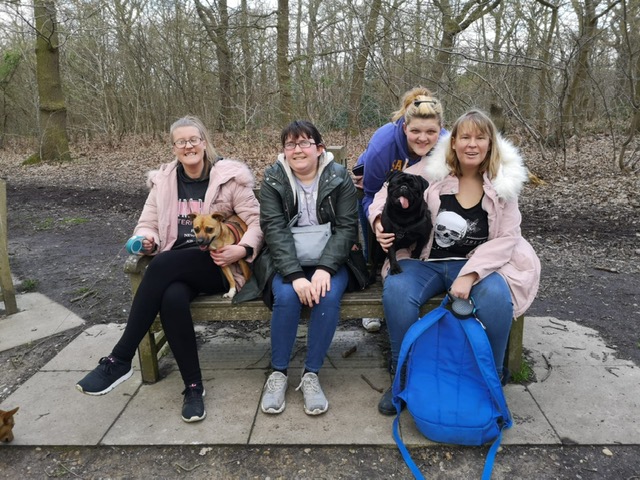Friends and Places Together, Southend. Dealing with damaging isolation
Home » Articles » Charities and support groups » Friends and Places Together
Friends and Places Together was established in 2012 as a Social Enterprise and changed to a  registered charity in 2014. Our overall aim is to improve the lives of more vulnerable young disabled people age range from 13 to 25 years old who live in Southend.
registered charity in 2014. Our overall aim is to improve the lives of more vulnerable young disabled people age range from 13 to 25 years old who live in Southend.
Friends and Places Together was established to increase the life opportunities available to disabled young adults through establishing valuable friendships, increasing their support networks and offering accessible activities that reduce feelings of isolation, increase levels of independence and help them enjoy a better quality of life overall. The concept was set up due to disabled young people being transported to school and parents not having relationships with their friend’s parents.
Dealing with damaging isolation
Our service deals with the damaging isolation experienced by young disabled people in the UK. It can be underestimated how limiting and frustrating it is a lack of social contact and friendships is on someone’s life, particularly so for young people.
But for those with disabilities the risk of social isolation is much higher than for their able bodied peers, with around 50% of children with disabilities leaving schools with no friendships and a lack of peer support for the future.
 Outside of the school environment many disabled individuals don’t have the opportunity, or don’t feel confident or able, to find or maintain friendships. The home environment can often unintentionally stifle their independence because parents are worried about their children going out on their own, or don’t actually know who their friends are if they have them (there is a lack of the ‘school run’ or parents meeting outside of school like at a lot of mainstream schools) so can’t help them maintain contact with them through other parents.
Outside of the school environment many disabled individuals don’t have the opportunity, or don’t feel confident or able, to find or maintain friendships. The home environment can often unintentionally stifle their independence because parents are worried about their children going out on their own, or don’t actually know who their friends are if they have them (there is a lack of the ‘school run’ or parents meeting outside of school like at a lot of mainstream schools) so can’t help them maintain contact with them through other parents.
Yet friendships are what help children develop valuable social skills, build confidence and facilitate the pursuit of interests out in the community e.g. sports, cultural activities, social events etc. In turn this affects what they feel they can achieve in life as an adult – without friendship children can suffer emotional and mental difficulties later in life. Add this to the challenges they already face because of their disability and they are at high risk of long-term social exclusion and a poorer quality of life.
Almost 1 in 3 young people with a learning disability spend less than 1 hour outside their home on a typical Saturday (Mencap, 2016). Recent research from Scope has also uncovered that a shocking 85% of young disabled adults from 18-34 year old age group feel lonely. As a result, over half of working age disabled people who have felt lonely in the past year said they experienced depression (62%) and anxiety (58%); and half (49%) experienced stress (Scope.org.uk. 2018).
Consultation and person-centred pilot
Consultation by Friends and Places Together was therefore undertaken with a number of local young disabled people and their parents to substantiate demand and influence service design.
 A person-centred pilot service was then set up and of the 15 children participating only 2 had ever met up with friends at home – contact was usually limited to just family members living with them. All 15 responded positively as a result of the project, with reports of all making connections with other young people and social activities; increases in confidence and levels of happiness; improvements in educational attainment; increased levels of independence; parents also enjoyed having a break from their caring role. The techniques used were also praised by all participants.
A person-centred pilot service was then set up and of the 15 children participating only 2 had ever met up with friends at home – contact was usually limited to just family members living with them. All 15 responded positively as a result of the project, with reports of all making connections with other young people and social activities; increases in confidence and levels of happiness; improvements in educational attainment; increased levels of independence; parents also enjoyed having a break from their caring role. The techniques used were also praised by all participants.
“She meets friends for the first time on her own and goes down town to Southend”
“For the first time, I felt listened to and met someone that knew where I should go for information”
“It’s amazing, he is now more confident at college and has since made new friends”
The people we support
The young people currently benefiting from the charity are aged 13-25 but we are looking to extend the service to over 25 as the needs are still there, although we work with children with any type of disability, many will have learning disabilities, autism or mental health needs.
We also work with children with life limiting and genetic conditions.
In addition we work with families in their caring role and local organisations important in the young person’s lives e.g. schools, colleges, local authorities, hospitals, service providers and other charities. In year one individuals will be based in South East Essex.
A user-led organisation
We are proud that we are a truly user-led organisation, with a management committee dominated by young disabled service users and parents. All the services we provide were originally planned and designed around the needs of beneficiaries and continue to develop today according to what young people and their families tell us they want and how best to help them.
Frequent beneficiary consultation (evaluation forms, interviews, steering group meetings, informal chats, Facebook comments, open days at youth/charity/education events etc.) has been undertaken since 2012 up until the present day. Such activities will continue for the next two years so service users continue to influence the future progression of the project.
Running the project day-to-day, we will continue to have young disabled service users and parents on the management committee to ensure user-representative views are given at all charity meetings. A youth steering group will meet quarterly to discuss any feedback and formally give their views on services. All users will also be expected to take part in individual evaluations of the project through interviews and surveys.
Creating a peer support network
All young service users will be encouraged and supported to create their own ‘peer support’ network as this helps them develop further friendships/connections/sources of support. Some will become volunteers and attend additional social activities to help more people link up and become friends/develop friendships.

The same goes for their parents, whereby parent support groups will be supported to get set up but then be left for them to run themselves.
Any young people interested in other areas of the charity will be welcomed to volunteer where possible on the project e.g. update Facebook page; organise new activities; help with administration etc. These will all help with work experience, building skills ready for college/university etc. All beneficiaries will be vital in helping to market the project further afield and share their experiences of the project.
Our outcomes
● More, and improved, friendships
● Stronger family relationships
● Increased levels of independence and empowerment
● More control over their lives and the choices they make
● Reduced feelings of social isolation/exclusion
● Increased levels of participation in society
● Improved mental and emotional wellbeing
● Improved levels of confidence and self-esteem
● Better physical health
● Better awareness of support and opportunities available to them
● An increase in overall quality of life
We have helped over 120 individuals and currently support 80 young adults.The added value is that parents/carers also enjoy valuable respite time when their children are away from home, increasing numbers benefiting from the project even further to at least 150 in the first year and 180 in the second.
New Premises
 In February 2019, we were delighted to move into our new premises in the Victoria Shopping Centre. We had a wonder official opening day with The Mayor and Mayoress of Southend cutting the ribbon, both Southend MPs attending, as well as our young people, their families and many friends and supporters.
In February 2019, we were delighted to move into our new premises in the Victoria Shopping Centre. We had a wonder official opening day with The Mayor and Mayoress of Southend cutting the ribbon, both Southend MPs attending, as well as our young people, their families and many friends and supporters.
Contact details
Website: https://friendsandplacestogether.org.uk/
Email: info@friendsandplacestogether.org.uk
Telephone – Over 18s: 07796 678 939
Telephone – Under 18s: 07904 271027
Top Floor Unit 13,14
Victoria Shopping Centre
Southend-on-Sea
SS2 5SP


